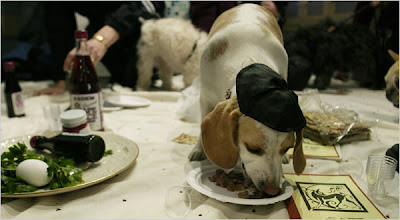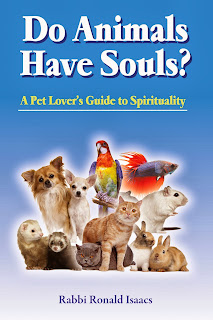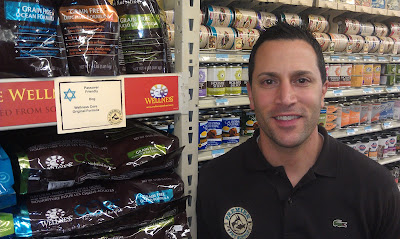As a rabbi I can relate to what my brother-in-law must feel when someone learns that he’s an animal expert and suddenly a game of 20 questions ensues. That happens to me when I’m at an event and someone (usually a non-Jew or an unaffiliated member of the Jewish faith) hears that I’m a rabbi. They take that opportunity to ask every question about Judaism that they’ve ever had and I become a living, breathing Wikipedia for them.
Category: Animals
 |
| A 2009 article in the NY Times featured a Passover Seder for dogs that took place at a Chicago pet food store to promote Evanger’s Dog and Cat Food Company which sells Kosher for Passover products. (Joshua Lott/Chicago Tribune) |
There is a custom of “selling” one’s pet to a non-Jew on Passover. The reason for this has to do with deriving benefit from chametz. Thus, if one leaves a pet with a non-Jew during Passover the pet owner will still derive benefit from chametz when the non-Jewish friend feeds the pet. Therefore, some observant Jews will “sell” the pet to the non-Jewish friend on the condition it is sold back at the conclusion of the holiday in the same fashion as the “legal fiction” sale of chametz.
While many Jews are not familiar with the laws governing pet food on Passover, it is reassuring that there are pet supply store owners like Mike Palmer who are concerned about this. It is admirable that he has taken the time to research this subject and has gone out of his way to help his Jewish customers find the right pet food for Passover.
At no time during my experience in a New York City rabbinical school did I think I would ever be donning full beekeeper regalia and watching as thousands of bees made honey on a farm in Michigan’s Amish country. But that is precisely what I found myself doing for the first time this past spring.
In addition to learning about the honey-making process, I’ve also learned about colony collapse disorder, the unexplained phenomenon of worker bees disappearing from hives causing a shortage of bee honey in recent years. I learned this from Don and Carol Ragan, a lovely couple who own the Windmill Hill Farm in Croswell (located in the “thumb” of Michigan). Carol first contacted me in February immediately after reading an article in the Detroit Free Press about Kosher Michigan, the kosher certification agency I started. She wanted to know what was involved in obtaining certification for her bee honey.
I told her that I would have to get back to her because I really wasn’t sure what it took to certify bee honey as kosher. The mere fact that bee honey is kosher is itself odd. After all, it is a product of the non-kosher bee (no insects except for certain locust species are deemed kosher by the Torah). So, how can a product of a non-kosher animal be kosher? It is believed that honey is kosher since it is produced outside of the body of the bee. But that isn’t totally true. In actuality, bees suck nectar from flowers with their proboscis (mouth) and this nectar mixes with saliva and is swallowed into the honey sac, where enzymes from the saliva break down the nectar into honey. The nectar is never digested, but rather transformed into honey by the saliva. The honey is regurgitated when the bee returns to the hive and the water is evaporated, thereby thickening it into honey which is then sealed in the honeycomb. The rabbis of the Talmud explain that bee honey is kosher since it is not an actual secretion of the bee, but rather the bee functions as a carrier and facilitator of the honey-making process.
All of this is interesting because honey is a staple food of the Jewish New Year’s holiday of Rosh Hashanah, which begins this year on Wednesday, Sept. 28. Honey sales increase in heavily populated Jewish areas thanks to this seasonal honey custom. Among the familiar traditions of Rosh Hashanah are the dipping of apple slices in honey and eating honey cake.
The Ragans knew that that adding kosher certification to their jars of honey would make their products more popular before Rosh Hashanah. Their Windmill Hill Farm produces 30,000 pounds of honey annually from more than 500 hives. All of their products are now certified kosher through my Kosher Michigan agency. Like many beekeepers around the country, the Ragans’ operation has grown from a hobby to a successful business. They began with only four hives that they discovered when they purchased the Croswell farm, but they quickly recognized how their passion could turn into profits.
“We’re passionate about making honey,” said Carol Ragan. “When we first discovered hives on our Croswell farm we were excited to experiment with making honey. We never realized how much we would come to enjoy it or how much of a market there is for honey products.”
Even with colony collapse disorder, beekeeping is on the rise throughout the country. New York City legalized recreational beekeeping last year, and even Michelle Obama had a beehive installed outside the White House.
Many members of the Jewish faith prepare dishes and baked goods with honey in time for Rosh Hashanah. Dan Sonenberg, owner of Johnny Pomodoro’s Fresh Market in Farmington Hills, Michigan, explained, “My honey sales increase ten-fold during the holiday season and we build honey displays next to our apple offerings in the store. This cross-merchandising makes it easier for our Jewish customers to purchase both during this time of year. Honey products are also featured in our kosher baked goods department where our most popular items are the apple fritter challah (Jewish egg bread) and the honey apple cake.”
While the Bible describes Israel as “the land flowing with milk and honey,” it was more than likely referring to date honey. Bees were not common in Israel thousands of years ago, but today Israel has about 500 beekeepers with approximately 90,000 beehives that produce more than 3,500 tons of honey annually.
The basis of using honey in baked goods and dipping apples into honey on Rosh Hashanah is to have a sweet year. While the secular New Year is kicked off with toasts of champagne, the Jewish New Year is launched with the sweet taste of honey. And maybe a little sugar high too.
There are certain things that we all read on the Web that we find unbelievable. Not “unbelievable” as in “amazing,” but events that simply cannot be believed. Some of these crazy things have actually occurred as reported, but many are simply hoaxes. Thank God for websites like Snopes.com to debunk these myths.
Last week, my hoax detector was going off at full speed when I read on Yahoo! News that a stray dog was condemned to death, or stoned, by a rabbinical court in Jerusalem. The report in Yahoo! News was reprinted from the Israeli newspaper Maariv which reported that a stray dog wandered into a Beit Din (religious court) in the strictly Orthodox neighborhood of Mea Shearim in Jerusalem and refused to be moved. A judge on the Beit Din determined the dog was a reincarnation of a secular lawyer who died 20 years ago. The article claimed that the judges on the Beit Din then “decreed” that local children stone the dog to death. Once the story hit Yahoo! News it got picked up by the BBC where it was the most read story of the day.
Of course none of this actually happened. It was a joke. That’s right, a joke. However, with news items traveling the globe at lightning speed thanks to the Internet, this story was everywhere within an hour. The damage was done even though Maariv issued a correction and apology on its website, JTA released an article explaining that there was no stoning of a dog, and Yahoo! News took the story down. It was already re-posted on hundreds of websites around the world.
The religious court issued the following statement:
There is no basis for stoning dogs or any other animal in the Jewish religion, not since the days of the Temple or Abraham… The female dog found a seat in the corner of the court. And the children were delighted by it; there were hundreds outside the court. They are used to seeing stray cats but most have never seen a dog before. The only action we took was to dial the number of the Jerusalem Municipality to get the people in charge to take it away.
There was no talk of reincarnation, a lawyer has never been mentioned, either now or 20 years ago, and there was no stoning. Such inventions are a kind of blood libel, and we wonder why the inventor of the story did not continue to describe how we collected the blood of the dog to make our matzah.
The story, when circulated on Yahoo! News, attracted more than 1,800 comments, most expressing violent anger. Just another example of people believing the truly unbelievable on the Web. Maybe it’s time for the large news agencies to actually fact check before publishing on the Web.
Yesterday marked the 49th day of the BP oil spill. Perhaps BP was going for the Hanukkah story connection, which is “The Oil lasted for 8 days.” Instead, BP got confused with the Jewish holiday of Shavuot, which is 49 days of counting the harvest and the 50th day (Shavuot) is the anniversary of the giving of the Torah on Mt. Sinai.
Hopefully this environmental mess will be remedied soon as the effects on wildlife are certainly a violation of the Jewish principle of “tzar ba’alei chayim” — the responsibility to treat animals ethically.




